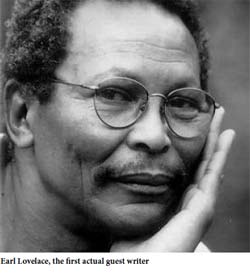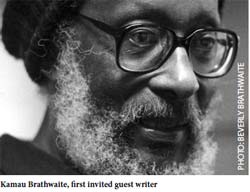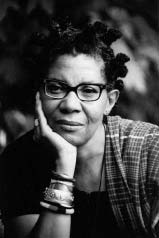 |
 |
 |
|
February 2010
|
From the Inside Pages (Part 1)As the 11th edition of Campus Literature Week begins, Professor Funso Aiyejina, describes its birth and the first decade of its life (1999-2009) under his stewardship.
In the original design of Campus Literature Week, the Guest Writer, in addition to giving public readings, was required to talk about his/her writing and about literature with our students; to give television and print interviews to sensitize the public to his/her work; and to generate public interest in literature. The noontime readings created the opportunity for a cross-section of the spectrum of literary talents available within and outside the campus, especially for those writers desirous of audience feedback on their work, to share their work with the public. The Main Library was chosen as the venue for the noontime readings as an affirmation of the synergy between the library and the Faculty of Humanities and Education as well as the centrality of the library to the primary business of the university as a centre of learning.
With the introduction of the MFA programme, the position of Guest Writer was re-engineered into that of Writer-in-Residence, with an expanded scope to include the facilitation of workshops for the students in the MFA programme and the length of stay was extended from two weeks to a maximum of two months. Olive Senior, who had visited as a Guest Writer in 2000, was the inaugural Writer-in-Residence in 2003 and worked with me to establish the foundation for the MFA programme. Also, with the introduction of the MFA, Campus Literature Week took on an additional significance as the platform for the MFA students to perform before an audience, in lieu of the academic seminar presentations required of traditional graduate students. Campus Literature Week also offers the MFA students the opportunity to hone their organizational skills as members of its organizing committee. From among such students has emerged Rhoda Bharath who, in addition to being one of the first three students to graduate from the MFA programme, displayed extraordinary commitment to Campus Literature Week, over the years, and, emerged as the de facto coordinator of the event for the 2007/2008 and 2008/2009 academic years. Over the years, some innovations have been introduced to make Campus Literature Week responsive to public demands and suitable for the demands of the MFA programme: Lovelace shared the spotlight with Ella Andall to underscore the synergy between oral and scribal chantwells; one of Olive Senior’s gala readings was introduced with a dramatized version of one of her stories by Samantha Pierre in a conflation that accentuated the eloquent orality of Senior’s fiction; on another occasion, Senior read to starry-eyed students of the Matura High School from amongst whom one hoped a writer would emerge in the future who would look back to that moment as the defining moment in his/her relationship with literature; John Stewart gave a reading at the Community Centre of his childhood village of Ste. Madeleine, with his childhood friends in the audience, an act that must have reminded the community of its central role as an important source of Stewart’s creative inspiration; there were readings of works in French and Spanish; open mic sessions were introduced to facilitate “of-the-street” participation; and in 2009, in the spirit of the desire for inclusiveness, we had a special noontime reading at the Eric Williams Medical Sciences Complex to facilitate lovers of literature at the Complex who found it difficult to make it to the Main Campus.
One of the most heart-warming achievements of Campus Literature Week is the way it has made it possible for our students to hear writers who are resident on the campus but most of whom we, unfortunately, hardly ever acknowledge as writers, let alone celebrate them. This list includes names like Merle Hodge, Cynthia James, Elizabeth Walcott-Hackshaw, Jennifer Rahim, Godfrey Steele, Barbara Lalla, Claudius Fergus, Christopher Starr, and Gordon Rohlehr, all of whom would have been known to students as lecturers but hardly as creative writers. Even more heart-warming is the excellent crop of student participants in the programme. These include Rhoda Bharath, Carolyn Harnanan and Sharon Syriac who have gone on to become fine writers in their own rights, and Muhammad Muwakil and his U-WE Speak Poets who are set for a bright future as performance poets, proud descendants of the poetic tradition of the Midnight Robbers of Trinidad and Tobago Carnival and the rapso tradition. A programme like this succeeds only with the goodwill of many. I wish to put on record my gratitude to the various office holders during this past eleven years: heads of the Department of Liberal Arts (Professor Kenneth Ramchand, Mr. Vishnu Singh, Professor Barbara Lalla, Professor Valerie Youssef, and Dr. Paula Morgan), deans of the Faculty of Humanities and Education (Mr Vishnu Singh and Professor Ian Robertson), and Campus Principals (Professor Compton Bourne, Dr. Bhoe Tewarie, Professor Bridget Brereton, and Professor Clement Sankat) whose support for Campus Literature Week has been unwavering. I wish too to thank all the student assistants and administrative assistants (especially Adel Bain) and the staff of the Humanities Division of the Main Library who worked tirelessly behind the scenes over the years to make Campus Literature Week a success. To all our faithful supporters over the years, thanks. –Professor Funso Aiyejina was Coordinator of Campus Literature Week from 1999 to 2009. He is a Professor of Literatures in English, and Dean of the Faculty of Humanities and Education, The University of the West Indies, St Augustine Campus. In the March Issue Our Guest Writer: NourbeSe Philip
She received her B.Sc. (Econ.) degree from The UWI, and then completed a Masters degree in Political Science as well as a degree in law at the University of Western Ontario, London, Ontario, Canada (1973). Although primarily a poet, NourbeSe Philip also writes both fiction and non-fiction. She has published three books of poetry, Thorns - 1980, Salmon Courage - 1983 and She Tries Her Tongue; Her Silence Softly Breaks - 1988 and has been the recipient of Canada Council awards, numerous Ontario Arts Council grants and was the recipient of a Toronto Arts Council award in l989. In 1988, she won the prestigious Casa de las Americas prize for the manuscript version of her book, She Tries Her Tongue... she is also the 1988 first prize winner of the Tradewinds Collective prize (Trinidad & Tobago) in both the poetry and the short story categories. Her first novel, Harriet’s Daughter, was published in l988 by Heinemann (England) and The Women’s Press (Canada). This book was one of two runners up in the 1989 Canadian Library Association Prize for children’s literature. Harriet’s Daughter was also first runner up in the Max and Greta Abel Award for Multicultural Literature. Her second novel, Looking For Livingstone: An Odyssey of Silence, was published in 1991. In 1994, her short story, “Stop Frame” was awarded the Lawrence Foundation Award by the journal, Prairie Schooner. Her short stories, essays, reviews and articles have appeared in magazines and journals in North America and England, and her poetry has been extensively anthologized. Her work—poetry, fiction and non-fiction—is taught widely at the university level and is the subject of much academic writing and critique. She has taught creative fiction at the third-year level at York University. |

 Campus Literature Week was initiated in 1999 by the Department of Liberal Arts. Professor Kenneth Ramchand, then Head of Department, had proposed that the university bring the Barbadian poet, Kamau Brathwaite, who was on an extended stay in Barbados, to the St. Augustine campus to give a reading, since he had never done so before. I suggested that rather than have only Brathwaite reading, we should consider establishing a Campus Literature Week as an avenue for showcasing the literary talents of students, staff and the wider society, with Brathwaite doing the gala reading to round off the week. This suggestion was accepted by the department and, since I was the one who opened his big mouth, I was assigned the task of coordinating it. I initiated contact with Brathwaite, with the help of his good friend, Professor Gordon Rohlehr, and got him to agree to come as a guest writer. Professor Ramchand oversaw the process that culminated in an official invitation to Brathwaite from the then Pro-Vice Chancellor and Campus Principal, Professor Compton Bourne. Unfortunately, just before the appointed date, we got word that Brathwaite had had eye surgery and had been ordered by his doctor not to fly. As fate would have it and because I am always a one-part pessimist, I had put Earl Lovelace on standby, in case, for one reason or the other, Brathwaite could not accept our invitation or, having accepted, had to cancel at the last minute. That then was how Lovelace became the first guest writer for Campus Literature Week in March, 1999. Lovelace, because of his generosity and his embrace of the vision behind Campus Literature Week would return a couple more times and become the most regular of our guest writers.
Campus Literature Week was initiated in 1999 by the Department of Liberal Arts. Professor Kenneth Ramchand, then Head of Department, had proposed that the university bring the Barbadian poet, Kamau Brathwaite, who was on an extended stay in Barbados, to the St. Augustine campus to give a reading, since he had never done so before. I suggested that rather than have only Brathwaite reading, we should consider establishing a Campus Literature Week as an avenue for showcasing the literary talents of students, staff and the wider society, with Brathwaite doing the gala reading to round off the week. This suggestion was accepted by the department and, since I was the one who opened his big mouth, I was assigned the task of coordinating it. I initiated contact with Brathwaite, with the help of his good friend, Professor Gordon Rohlehr, and got him to agree to come as a guest writer. Professor Ramchand oversaw the process that culminated in an official invitation to Brathwaite from the then Pro-Vice Chancellor and Campus Principal, Professor Compton Bourne. Unfortunately, just before the appointed date, we got word that Brathwaite had had eye surgery and had been ordered by his doctor not to fly. As fate would have it and because I am always a one-part pessimist, I had put Earl Lovelace on standby, in case, for one reason or the other, Brathwaite could not accept our invitation or, having accepted, had to cancel at the last minute. That then was how Lovelace became the first guest writer for Campus Literature Week in March, 1999. Lovelace, because of his generosity and his embrace of the vision behind Campus Literature Week would return a couple more times and become the most regular of our guest writers. In the first decade of Campus Literature Week, we hosted the following writers: Earl Lovelace (1999, 2005, 2008); Olive Senior (2000, 2003); Jan Carew (2001); Austin Clarke (2002); Lawrence Scott (2004); Erna Brodber (2006); John Stewart (2007); and Rachel Manley (2009). On the occasion of the inaugural Campus Literature Week in 1999, those present were called upon “to witness the planting of a seed which we hope to see grow into an inevitable part of our annual calendar.” Not only has Campus Literature Week grown into an event that many look forward to every year, but its success inspired the introduction of the Master of Fine Arts (Creative Writing – Fiction) programme in the 2002/2003 academic year.
In the first decade of Campus Literature Week, we hosted the following writers: Earl Lovelace (1999, 2005, 2008); Olive Senior (2000, 2003); Jan Carew (2001); Austin Clarke (2002); Lawrence Scott (2004); Erna Brodber (2006); John Stewart (2007); and Rachel Manley (2009). On the occasion of the inaugural Campus Literature Week in 1999, those present were called upon “to witness the planting of a seed which we hope to see grow into an inevitable part of our annual calendar.” Not only has Campus Literature Week grown into an event that many look forward to every year, but its success inspired the introduction of the Master of Fine Arts (Creative Writing – Fiction) programme in the 2002/2003 academic year. The roll call of writers who have read during the noontime sessions is a veritable list of who-is-who in the emergent Trinidad and Tobago literature. We can boast of the participation of Pearl Eintou Springer, Anson Gonzales, Valerie Belgrave, Kevin Baldeosingh and Lisa Allen-Agostini among some of our notable off-campus guests. We can also boast of having provided the opportunity for many student-writers from other Caribbean islands like St. Vincent and the Grenadines, St. Lucia and the Bahamas to showcase their work to the St. Augustine community.
The roll call of writers who have read during the noontime sessions is a veritable list of who-is-who in the emergent Trinidad and Tobago literature. We can boast of the participation of Pearl Eintou Springer, Anson Gonzales, Valerie Belgrave, Kevin Baldeosingh and Lisa Allen-Agostini among some of our notable off-campus guests. We can also boast of having provided the opportunity for many student-writers from other Caribbean islands like St. Vincent and the Grenadines, St. Lucia and the Bahamas to showcase their work to the St. Augustine community. M. NOURBESE PHILIP is a poet, writer and lawyer who was born in Tobago and now lives in Canada. She will be the guest writer at this week’s Campus Literature Week at The UWI.
M. NOURBESE PHILIP is a poet, writer and lawyer who was born in Tobago and now lives in Canada. She will be the guest writer at this week’s Campus Literature Week at The UWI.